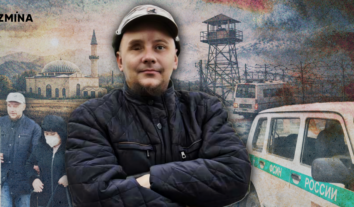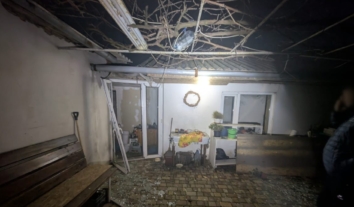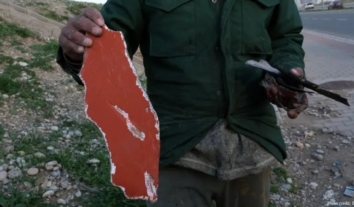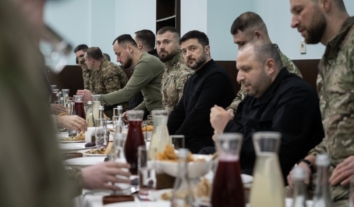Elections 2015: IDPs demand that Parliament give them right to vote
The public activists insist on inadmissibility of discrimination against 1.5 million displaced persons and demand to give them the right to vote in the local elections.
Nadiya Pashkova, Program Director of the Committee of Voters of Ukraine moved from Donetsk along with her organization. Her colleagues had to leave since the organization was very patriotic and politically active, she says.
Red-haired Nadiya is dressed in jeans and a lilac blouse with a huge yellow and blue trident. She is holding a poster in her hands, saying Equal Political Rights. In July, Ukrainian lawmakers passed the new law on local elections, thus depriving the IDPs of the electoral rights, in particular, the right to elect members of village, town and city councils and the heads of the territorial communities they live in. Therefore, the woman together with other activists is standing near the Verkhovna Rada of Ukraine, demanding that MPs remedy the situation by adopting the bill No.2501a-1.
“I’ve always had a political and public stance,” Nadiya Pashkova says. “When I found out that I wouldn’t be able to vote in these elections, I was offended. The government’s attitude to me, my friends, relatives and other displaced persons insults me. It’s easy for the authorities to grant the displaced persons the right to vote.”
According to the activist, if the government still doesn’t allow the displaced persons to vote in the local elections on October 25, the considerable social tension will arise.
Oleksandr Kliuzhev, the expert on elections in the Opora (“Support”) civic network shares indignation of Nadiya Pashkova.
“The most pro-Ukrainian and business active part of the displaced persons are offended. And not just because the current law on local elections does not give them the right to vote in the new territorial communities they work and pay taxes in. They have political reasons as nobody sees them as people who may bring new energy, new businesses and new results into new territorial communities. The displaced persons from Donbas are believed to vote for separatist forces for some reason,” Oleksandr Kliuzhev sums up.
The expert strongly believes that the citizens living in the territorial communities, which are new for them, have the right to influence decision-making in these local communities, “There is a widely discussed issue on the entrepreneurs, who have re-registered their business in the Ukraine-controlled territory. They ask, ‘Why is it so? When we pay taxes to the local budget, we are considered to be the members of the territorial community. Meanwhile, if we want to control how our taxes are used in the new communities, we aren’t considered the members of society.”
Displaced person from occupied Simferopol (Crimea) Oleksandra Dvoretska is often asked whether the IDPs may elect the authorities if they do not understand local problems, but Oleksandra is sure that they can.
“The displaced persons have appealed to all the local authorities over the last year and a half. They have resorted to the migration service and appealed to the social protection services. They go to the clinics and use the public transport the same way as residents of Kyiv do. Those people, who have been displaced, have already made their choice in favor of Ukraine. They have decided that they want to live neither in any self-proclaimed republics, nor in Crimea, occupied by the Russian Federation. They want to live in Ukraine and influence the decisions here, in Ukraine. If they have already moved here, they have already become members of the territorial community,” Oleksandra Dvoretska believes.
Olha Aivazovska, coordinator of electoral and parliamentary programs in the Opora (“Support”) civic network, explains that the right to vote for the IDPs lies within the context of the universal human rights, “If Ukraine does not want to reintegrate this large-scale group of citizens in the electoral process, it violates the common code of human rights, accepted and recognized by the whole world.”
Parliament Commissioner for Human Rights Valeria Lutkovska believes that deprivation of the right to vote discriminates the IDPs, and this restriction has no legitimate, objective and reasonable purpose.
“Such situation violates the principle of non-discrimination, both in terms of securing the equality of rights and freedoms and the equality of possibilities (the Article 2 of the Law of Ukraine “On Prevention and Combating Discrimination in Ukraine”), creates indirect discrimination on the grounds of place of residence and belonging to the group of IDPs, and contradicts the international law, the Constitution, the laws of Ukraine, and the commitments of Ukraine to ensure the sustainable integration of the IDPs at the place of displacement,” reads the open letter of the Ombudsperson to MPs of Ukraine.
Amendments proposed
The Ukrainian Parliament now has three pending bills on protection of electoral rights of the IDPs. Among them there is the bill No.2501a-1, elaborated by the MPs from different factions and the relevant NGOs.
The document suggests that the IDPs may change their electoral address by making petition. A person, who wishes to take part in the elections, should submit the application as well as the certificate of registration of internally displaced person to the state register department 15 days prior to the elections.
“The place of registration of an IDP remains in the occupied territory, but he or she has new electoral address in the territorial community where he or she has decided to live, to integrate and participate in local affairs,” Serhiy Tkachenko, executive director of the Donetsk regional organization of the Committee of Voters Ukraine, notes.
The draft law does not allow changing the electoral address for the second time within 365 days. This principle should protect the elections from fraud and manipulation of votes of the internally displaced persons, the experts say.
The NGOs calls on the Parliament to pass the bill as soon as possible. They hope that the MPs will approve it till the end of September, so that civil society has at least two weeks and ten days to carry out explanatory work among the IDPs.
“We don’t know how many people will take advantage of the right to vote. But this right should be definitely granted to them. It will be up to the displaced persons to use it or not,” Serhiy Tkachenko says.
Former governor of Donetsk region Serhiy Taruta notes that the issue of participation of the IDPs in the local elections was repeatedly raised at the Yalta European Strategy (YES) conference, recently held in Kyiv.
“Western politicians appealed to Groysman [Speaker of the Verkhovna Rada] asking him to ensure the rights to people, deprived of them. This question is very relevant and was on the agenda of all the discussions. It is very important to avoid discrimination against the persons who have already suffered much,” the MP stresses.
According to Olha Aivazovska, the vote in the Parliament will demonstrate whether there is the civilized society in Ukraine, “If we are developed and civilized society, which has changed drastically after 2014, the vote on the right to vote for IDPs will be one of the indicators to assess these changes.”

















